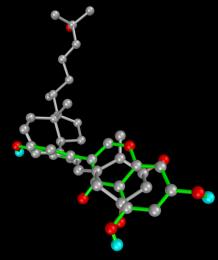
This is an old revision of the document!
Table of Contents
Soy
Given its harmful effects on the nuclear receptorsIntracellular receptor proteins that bind to hydrophobic signal molecules (such as steroid and thyroid hormones) or intracellular metabolites and are thus activated to bind to specific DNA sequences which affect transcription. and sex hormones, soy has an undeserved reputation for being healthy. It is not unusual for patients with inflammatory diseases to react negatively to substances in soy called phytoestrogens, of which isoflavones are one kind.
Patients on the Marshall ProtocolA curative medical treatment for chronic inflammatory disease. Based on the Marshall Pathogenesis. (MP) are advised to restrict intake of soy and soy products.
Isoflavone content of soy
Fermented soy products include miso, tempeh, natto, and soy sauce. Generally speaking, they contain smaller amounts of isoflavones than nonfermented soy products such as tofu, soy milk, soy protein powder, soy cheese, soy burgers.
One reference reports the following isoflavone content in milligrams:
| Isoflavone content of <html>soy</html> products | |
|---|---|
| tofu, 400g | 60.9-81.2mg |
| <html>soy</html> milk, 200ml | 52.1mg |
| natto, 40-50mg | 29.9-36.8mg |
| miso, 1 tbsp. | 8.9mg |
| <html>soy</html> sauce, 1 tbsp. | 0.7-1.2mg |
It is not clear what the precise isoflavone content of all soy products is. In general, unfermented products such as soybean oil and soy flour have a higher isoflavone content than fermented products and should be avoided by MP patients.
It should not be hard to identify and avoid processed foods containing soy oil and soy flour. Many commercially-sold foods include small amounts of soy lecithin, an emulsifier, which would be much smaller amounts of isoflavone. Soy lecithin (granules) used as a food supplement is contraindicated.
Molecular effects of phytoestrogens found in soy
 Soy is immunosuppressive, as it contains phytoestrogens such as genistein, which act directly on the Vitamin D ReceptorA nuclear receptor located throughout the body that plays a key role in the innate immune response..1) On the right is an image of genistein and 1,25-DPrimary biologically active vitamin D hormone. Activates the vitamin D nuclear receptor. Produced by hydroxylation of 25-D. Also known as 1,25-dihydroxycholecalciferol, 1,25-hydroxyvitamin D and calcitirol. as they dock into the VDRThe Vitamin D Receptor. A nuclear receptor located throughout the body that plays a key role in the innate immune response..
Soy is immunosuppressive, as it contains phytoestrogens such as genistein, which act directly on the Vitamin D ReceptorA nuclear receptor located throughout the body that plays a key role in the innate immune response..1) On the right is an image of genistein and 1,25-DPrimary biologically active vitamin D hormone. Activates the vitamin D nuclear receptor. Produced by hydroxylation of 25-D. Also known as 1,25-dihydroxycholecalciferol, 1,25-hydroxyvitamin D and calcitirol. as they dock into the VDRThe Vitamin D Receptor. A nuclear receptor located throughout the body that plays a key role in the innate immune response..
For someone who is healthy, this is not a necessarily problem, but when one is ill with Th1 inflammationThe complex biological response of vascular tissues to harmful stimuli such as pathogens or damaged cells. It is a protective attempt by the organism to remove the injurious stimuli as well as initiate the healing process for the tissue., the VDR is already compromised quite severely.
Mitchell, et. al., imply that only 40mg of isoflavones a day is likely to produce concentrations (about 500 nanomolar) capable of affecting the Vitamin D Receptor.2) This suggests that one need only consume 20 grams of roasted soyabeans - equivalent to 37mg of isoflavones - to have more than enough plasma concentration to further compromise the immune system.
Genistein interferes with the operation of at least three key nuclear receptors: the Vitamin D Receptor, the PPAR-gamma and PPAR-alpha.
According to unpublished research from Trevor Marshall, PhD:
The molecule with the green spine is genistein. Interestingly, it is a partial agonist, forming hydrogen bonds with SER278, TYR143, ARG274 and SER278, the same residues as 1,25-D hydrogen bonds to. However, it doesn't have the 'tail' of vitamin D or Benicar, and cannot transcribe those DNA genes using coactivators which need helix 12 to be stabilized. Ki calculates at about 0.5 micromolar.
Epidemiological impact of phytoestrogens
The harmful effects of the phytoestrogens in soy has been observed in certain vegetarian populations. One British study concluded that “phytoestrogens have a deleterious effect on the developing male reproductive system,”3) including the increased risk of hypospadias.
Researchers at Loughborough University in England recently published two studies in the journal Dementias and in Geriatric Cognitive Disorders which found that eating high levels of some soy products may raise the risk of memory loss.4)
The research team, led by Professor Ef Hogervorst, tracked soy intake and subsequent memory function in 719 elderly Indonesians living in urban and rural regions of the island of Java. They found high tofu consumption - at least once a day - was associated with worse memory, particularly among subjects over 68 years of age.
Read more
- High tofu intake correlated with memory loss <html> </html>

- Notre Dame researchers confirm the effect of soy on the Vitamin D Receptor <html> </html>

Notes and comments
* Legacy content

